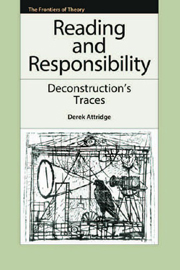Book contents
- Frontmatter
- Contents
- Acknowledgements
- Series Editor's Preface
- Introduction
- 1 Derrida, Deconstruction and Literary Criticism
- 2 Deconstruction Today: Literature, Postcolonialism and the Secret
- 3 Following Derrida
- 4 The Impossibility of Ethics: On Mount Moriah
- 5 Arche-jargon
- 6 Deconstruction and Fiction
- 7 Posthumous Infidelity: Derrida, Levinas and the Third
- 8 Roland Barthes's Obtuse, Sharp Meaning and the Responsibilities of Commentary
- 9 Nothing to Declare: J. Hillis Miller and Zero's Paradox
- 10 Radical Atheism and Unconditional Responsibility
- 11 The Place of Deconstruction: A Conversation with Jean-Michel Rabaté
- Bibliography
- Index
4 - The Impossibility of Ethics: On Mount Moriah
Published online by Cambridge University Press: 12 September 2012
- Frontmatter
- Contents
- Acknowledgements
- Series Editor's Preface
- Introduction
- 1 Derrida, Deconstruction and Literary Criticism
- 2 Deconstruction Today: Literature, Postcolonialism and the Secret
- 3 Following Derrida
- 4 The Impossibility of Ethics: On Mount Moriah
- 5 Arche-jargon
- 6 Deconstruction and Fiction
- 7 Posthumous Infidelity: Derrida, Levinas and the Third
- 8 Roland Barthes's Obtuse, Sharp Meaning and the Responsibilities of Commentary
- 9 Nothing to Declare: J. Hillis Miller and Zero's Paradox
- 10 Radical Atheism and Unconditional Responsibility
- 11 The Place of Deconstruction: A Conversation with Jean-Michel Rabaté
- Bibliography
- Index
Summary
What really got me hooked were the cats. This is the sentence out of which they sprang at me:
How would you ever justify the fact that you sacrifice all the cats in the world to the cat that you feed at home every day for years, whereas other cats die of hunger at every instant?
Readers who have not been pounced on by these cats themselves will need to know that I am quoting from Jacques Derrida's The Gift of Death, and more specifically from the third chapter, ‘Whom to Give to [Knowing Not to Know]’. I recall vividly the first time the cats got their claws into me: it was in the attic lounge of the Normandy chateau of Cerisy-la-Salle in 1992, a day or two after Jean- Michel Rabaté had arrived with a trunkful of copies of L'Éthique du don, containing Derrida's work, hot from the Paris presses. I was playing truant from that morning's sessions of the Derrida décade in order to read ‘Donner la mort’, and I was most unjustly being rewarded for my lack of commitment by the gift of some of Derrida's most startling articulations.
Derrida introduces the cats as part of his radical quotidianisation, if I may call it that, of a short Biblical text, the Akedah, the story of the Binding of Isaac. This short narrative – nineteen verses of Genesis chapter 22 – has, of course, been subject to numerous and varied commentaries and retellings.
- Type
- Chapter
- Information
- Reading and ResponsibilityDeconstruction's Traces, pp. 56 - 77Publisher: Edinburgh University PressPrint publication year: 2010



